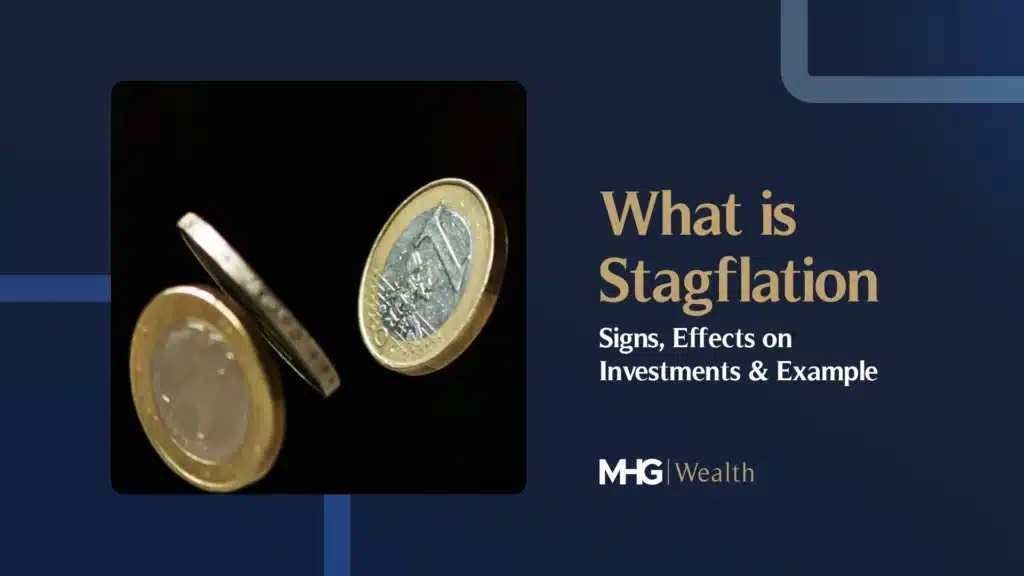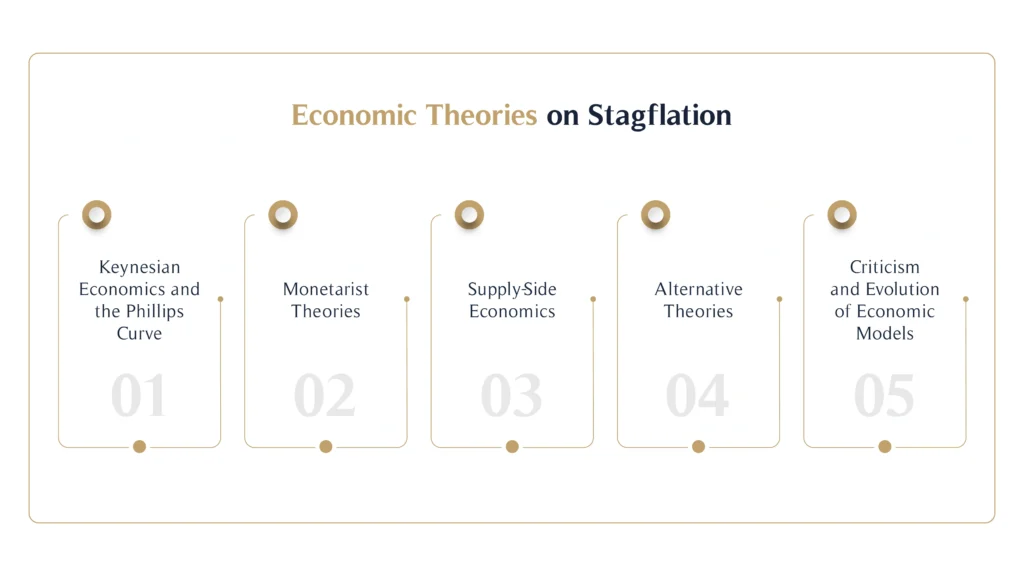What is stagflation?
You might have heard the word stagflation and wondered what it meant. It’s a cobbled-together word, a mixture of inflation and stagnation. Stagflation has a simple meaning. Prices keep rising, but the economy refuses to grow. Economists often add a third condition to the mix: high unemployment.
Why is stagflation a problem?
Stagflation can attack your investments in three ways.
First, stagnant economies usually depress company profits. These lower returns can set stock prices tumbling. Tourism or entertainment companies may struggle if their customers worry about unemployment. Stagflation can syphon away your wealth if your portfolio contains vulnerable stocks.
Second, governments often raise interest rates when inflation is high. Bonds can return less than the rate of inflation, and long-term bonds are especially vulnerable.
Third, you might want to invest the returns from your investments, but high inflation might mean your returns will buy less.
What are the warning signs of stagflation?
You can act if you know global stagflation is coming.
You should watch the market. Monitor unemployment rates, and GDP (Gross Domestic Product). If UK unemployment rises and GDP stalls, UK stagflation becomes a risk.
If you see inflation climbing sharply, or if you hear about lots of massive wage increases, you should also expect stagflation.
Economists argue about the exact causes of global stagflation, but most agree interruptions to essential supplies can bring trouble. Is shipping not getting through the Suez Canal? Are petrol prices soaring? Will companies delay any expansion plans or cancel new advertising campaigns? Are consumers hoarding food?
If they are, you should prepare.
What are the best investments during stagflation?
Governments disagree about how to handle stagflation, but as an investor, there are steps you can take to reduce the consequences. Some investments will perform better than others.
Diversify
Make sure you spread your investments around. Pick some low-risk and low-return assets and mix them up with higher-returning ones. You should combine your asset types, too, so consider investing in stocks, bonds, cash and real estate. Have a look at alternative investments too, like collectibles and art works. Commodities like precious metals or oil can also help fill out your investment portfolio.
Aim for resilience
Customers will always buy food and drink no matter how prices increase. With that in mind, invest more in companies which provide services people can’t live without. Food and beverage companies can become safe havens for investors during stagflation. Energy utility firms and healthcare providers are also good bets.
Favour companies with healthy balance sheets. Those with little debt will have less trouble paying their bills.
Index it up
Index-linked bonds have their yields linked to inflation. In the UK they’re known as index-linked gilts, and they pay more if inflation rises.
Get professional help
Finding the right path to avoid stagflation is tough. Real estate can help you avoid trouble, but it can also be a minefield. Real estate can be tricky to sell, and the markets are often volatile.
Seek advice from someone who knows the ins and outs of these investments. At MHG Wealth, we ask the right questions and create a plan which fits your needs.
Are you after long-term secure growth? Or are you happy taking a few risks? Are you saving for your child’s education, or do you want to put a down-payment on a house? The right financial advice will pay for itself many times over.
Real world example
Let’s say there’s an investor called Mike. He has £1,000,000 invested.
A third is in stocks and shares. He’s invested in a broad market tracker fund, and spread his money over a wide range of industries.
Another third is in bonds paying an average of 4%.
The rest is in commodities. Industrial metals and infrastructure, including a range of toll booths.
What effect would stagflation have?
Customers might see bad economic news and stop buying luxuries. Companies exposed to expensive restaurant chains or holiday companies could see their stock prices plummet.
Companies with lots of debt on their books would pay more interest. Other investors could sell those shares, and again those stock prices would fall.
Investors often put money in early-stage startups, and hope for serious money in the future. But if the markets turn pessimistic, those startups could lose their shine.
Mike’s bonds will struggle to make money if inflation stays high.
His commodities would be a mixed bag. Companies might delay or cancel new infrastructure projects, and the demand for industrial metals might drop.
Mike sees the storm coming and asks his investment advisor for help.
After discussion, Mike reduces his bond holdings, and shifts his remaining bonds into index-linked gilts.
His share portfolio now contains more healthcare companies and more food distributors. He moves out of luxury sectors.
Armed with specialist advice, he makes a tactical investment in a property development firm, and he also invests in energy providers.
Stagflation will never be good news, but Mike’s changes shield him from the worst effects.
Economic Theories on Stagflation
Stagflation is a rare economic condition, and over the decades, economists have tried to explain why it happens. Let’s explore the key theories that provide different perspectives on this puzzling phenomenon.
Keynesian Economics and the Phillips Curve
Keynesian economics once argued that inflation and unemployment couldn’t coexist. This belief was rooted in the Phillips Curve, which showed an inverse relationship between inflation and unemployment.
In theory, higher inflation means lower unemployment, and vice versa. However, stagflation in the 1970s broke this model. Prices were soaring, yet unemployment remained stubbornly high—something Keynesian models struggled to explain.
To address this gap, neo-Keynesian economists proposed that external shocks, like rising oil prices, could push up costs (known as cost-push inflation) while reducing economic output, creating stagflation.
Monetarist Theories
Monetarists, led by economists like Milton Friedman, pointed to monetary policy mismanagement as a primary cause of stagflation. They argued that excessive money supply growth during the 1970s caused inflation to spiral out of control. At the same time, restrictive policies aimed at curbing inflation stifled economic growth, worsening stagnation. According to monetarists, balancing the money supply with economic productivity is crucial to avoiding stagflation.
Supply-Side Economics
Supply-side theories focused on the production side of the economy. They argued that stagflation occurred when productivity fell, often due to higher taxes, restrictive regulations, or supply chain disruptions. By addressing these bottlenecks, governments could restore growth without fuelling inflation. For example, policies like reducing corporate taxes and deregulation were implemented in the 1980s to tackle stagflation’s lingering effects.
Alternative Theories
Other economists, such as those supporting the differential accumulation theory, looked at stagflation through a global lens. They suggested that unequal resource distribution, geopolitical conflicts, and corporate power struggles could create prolonged economic stagnation.
Another alternative view tied stagflation to structural imbalances, such as declining industrial sectors or mismatched labor skills, which limited economic growth despite rising prices.
Criticism and Evolution of Economic Models
Stagflation has forced economists to rethink traditional models like the Phillips Curve. Critics argue that these models oversimplify complex economic dynamics. Today, many theories incorporate both aggregate supply and demand factors, recognising that real-world economies don’t always follow neat, predictable patterns.
Historical Context of Stagflation
To understand stagflation, we need to look back at its most infamous episode—the 1970s. This decade reshaped how economists and policymakers viewed inflation, unemployment, and economic growth.
The 1970s Oil Crisis and Stagflation
The 1970s stagflation began with the 1973 oil crisis, when the Organization of Petroleum Exporting Countries (OPEC) imposed an oil embargo. Global oil prices skyrocketed, causing a domino effect: production costs rose, transportation became more expensive, and everyday goods became pricier. This led to cost-push inflation—a situation where rising production costs drive up prices.
At the same time, economies around the world struggled to grow. High energy prices slowed industrial output, and businesses cut back on hiring, leading to widespread unemployment. This unique combination of stagnant growth and inflation gave rise to the term “stagflation.”
Economic Turmoil and Recovery
Stagflation didn’t just affect energy markets; it disrupted the broader economy. The 1973–1975 recession saw GDP decline across major economies, while the stock market crash wiped out investor wealth. In the UK, the 1976 currency crisis forced the government to seek a bailout from the International Monetary Fund (IMF).
Governments experimented with various policies to combat stagflation. In the US, wage-price controls were introduced to cap inflation, but these measures often backfired, leading to shortages. The lesson learned was that controlling inflation required more targeted approaches, such as tackling supply constraints or improving productivity.
The Role of Monetary Policy
The 1980s marked a turning point. Central banks, led by the US Federal Reserve, adopted strict monetary policies to curb inflation. Interest rates were raised to record levels, making borrowing expensive but ultimately bringing inflation under control. This approach, while painful in the short term, helped restore economic stability.
Lessons from the 1970s
The stagflation of the 1970s left lasting lessons for policymakers. It underscored the importance of energy independence and diversified economies to avoid over-reliance on volatile sectors. It also highlighted the need for flexible economic models that consider external shocks and global interconnectivity.
By studying this historical period, today’s investors and policymakers can better prepare for similar challenges, ensuring they protect wealth while navigating economic turbulence.
Conclusion
If you get the right advice and take the right action, you can protect your investments. Focus on long-term goals. Stagnation can make markets volatile but avoid reacting to short-term fluctuations.
Our team at MHG Wealth Management can recommend the right investments and help you avoid anything unsafe. The team will then work with you to create a plan that suits your needs and situation. One which considers your attitude to risk, understands how long you want to invest for, and what you’re investing for. A plan which works for you and your family to give you financial peace of mind. Contact us today to start your journey.






